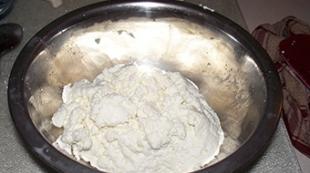Human DNA was found in Russian sausage. Human DNA has yet been found
Representatives of the Dixie network reported that AKORT ordered an examination of the products of the Mortadel agricultural complex near Moscow.
The Mortadel agro-industrial complex was again in the top news - all yesterday, numerous Russian media outlets were circulating news with an eerie headline: “Experts have found traces of human DNA in a sausage from the Moscow region,” but with each passing hour this story acquired more and more details. . It turned out that no research had been carried out, and the source of information for journalists was fake documentation. Realnoe Vremya contacted Mortadel vice-president Elvira Agurbash, who told who could be behind the information “stuffing”, whether the journalists apologized to her and what consequences should be expected for the publication that disseminated information discrediting the reputation of her company.
“The institute staff were shocked...”
It was reported that specialists from the Federal Research Center for Nutrition, better known as the Institute of Nutrition of the Russian Academy of Medical Sciences, discovered human DNA in the products of the Mortadel meat processing plant. An employee of this scientific organization allegedly told the journalist of the Izvestia newspaper, which was the first to disseminate this information, about this.
The note was replete with details: “Laboratory tests revealed human traces in two Mortadel products at once - “Royal” sausage and granular cervelat.” And Izvestia’s anonymous interlocutor was sincerely indignant: “I don’t remember such cases recently. Honestly, this is something out of the ordinary.”
Naturally, this news did not go unnoticed by Elvira Agurbash, vice-president of the Mortadel agro-industrial complex - her friends sent her a link to a Ren-TV story about human DNA in her company’s sausage, as well as to Izvestia. She hastened to seek clarification from the institute that appeared in the media materials.
The institute staff were shocked; they were not even ready to immediately answer the question of whether there was such a protocol at all, and on what basis it was carried out. On Ren-TV and in Izvestia it was said that samples were allegedly taken at our production, but there were no requests to our production for the purpose of taking samples, Elvira Agurbash told Realnoe Vremya.
Realnoe Vremya was unable to promptly obtain a comment from the press secretary of the Institute of Nutrition of the Russian Academy of Medical Sciences, Elena Puzova, but in a conversation with Ren-TV, she stated the following: “This is nonsense, this is a lie. And with this (media publication, - approx. ed.) the prosecutor's office will deal with it, apparently. We do not perform any monitoring or supervisory functions. We have research goals.”
Echo of the conflict with Dixie?
Considering that on July 28 we had a meeting of the Federal Antimonopoly Service, where a case was initiated against the Dixie retail chain... I was personally present at the meeting, and the lawyer for this company also stated that they had carried out an examination of the sausage and allegedly found human DNA there. When they told him that this was a very serious accusation and asked whether he was now ready to bear responsibility for what was said, he stopped it, comments Elvira Agurbash.
As Vladimir Rusanov, head of the Dixy press service, told Realnoe Vremya, in the spring of this year the Association of Retail Companies (AKORT) ordered an examination of Mortadel products from the Federal State Budgetary Institution Federal Research Center for Nutrition, Biotechnology and Food Safety. Products for research were purchased from the manufacturer's stores. As a result, out of 26 samples, four exceeded the norms for human DNA content. This was mentioned at the meeting held on July 28, and relevant documents were also attached to the case.

In March of this year, Mortadel demanded from the fourth largest retailer in Russia, the Dixie chain, 104 million rubles, which the company paid to the retailer for “false marketing.” Photo: retail-loyalty.org
Let us recall that in March of this year, Mortadel demanded from the fourth largest retailer in Russia, the Dixie chain, 104 million rubles, which the company paid to the retailer for “false marketing.” After this, the companies filed mutual complaints to the FAS. Dixie's claim was rejected, and the meat manufacturer's application was accepted. As a result, the FAS opened a case against one of the largest Russian retailers. Dixy is suspected of imposing conditions on the supplier that were prohibited by the Trade Law and limiting access to the product market.
Note that a few days before information about “human DNA in sausage” appeared in the media, unknown attackers entered the territory of the head enterprise of the Mortadel meat processing complex.
We had 18 doors opened, 10 safes, and one of my small safes was taken away from my office. In the lawyer's office, all the documents were gutted from the safe, everything was scattered, forensic experts checked - there were fingerprints everywhere. They turned off the alarm and did everything very professionally. There were five very powerful safes in the office of the company president, but they were all hacked, said Elvira Agurbash. - I don’t have any direct accusations, but I had a folder in which, when we were just beginning our internal proceedings with the Dixie company, I collected flash drives and materials.
The head of the press service of the Dixy Group of Companies, Vladimir Rusanov, did not give an official comment to Realnoe Vremya on this matter, limiting himself to the explanation: “The company is not responsible for the safety of personal belongings in third-party organizations, so there is nothing to comment here.”

“This is a huge economic loss,” summarizes Agurbash. Photo mortadel.ru
“They apologized to us, they called from Izvestia”
After the scandal acquired serious proportions, the vice-president of Mortadel received a call from Izvestia and apologized.
They apologized to us and called from Izvestia. They are preparing a refutation. They explained what happened to us like this: supposedly their employee did everything with no one, without coordinating his actions. Somehow he ended up with a falsified protocol in his hands, and he submitted it for publication without approval. We were also informed that the employee who prepared this text without talking with the other party was fired,” said Elvira Agurbash.
Note that Izvestia, which disseminated the information, promptly removed the material from its website. The newspaper's editorial office told Realnoe Vremya's correspondent the following: “We do not give any comments and have already made a refutation.”
According to the vice president of the company, lawsuits against Ren-TV and Izvestia will most likely be prepared on Monday.
The sediment remained. A huge number of media outlets wrote about this, and people still read it. The reputation that we have earned over decades is under attack. This is a huge economic loss,” summarizes Agurbash. - We invited veterinary services to come and take a look and take samples. This is done in order to once again prove that we are an honest manufacturer.
Lina Sarimova
Based on the data provided by Rosstat, we can say that the country is fully self-sufficient in its chicken, pork and turkey meat. Experts say that the total share of Russian goods on store shelves is 77%, and for main product groups such as bread, meat, milk, fish and eggs - 100%. The share of domestic sausage on the market reaches 98.4%, flour - 98.2%, cereals - 99.8%, poultry - 95.2% and pork - 92.1%.
Consumer refusals
But at the same time, last year there was a decline in sales of sausages and meat delicacies by 6.4% to 2.4 million tons. The drop is explained by two reasons. The first is the desire of citizens to save money against the backdrop of a general rise in prices and a reduction in real incomes. The second is a decrease in product quality.
Dairy products also raise complaints. The studies found that only 7 out of 30 samples of domestic cheese were produced in accordance with GOST. Among the deviations are an increased content of antibiotics, a large amount of palm oil and unseasoned products.
The high-profile story with the Omsk Cheese Trading House LLC also did not improve consumer attitudes towards domestic dairy products. During the scandal, it turned out that the plant's employees in the production workshop were bathing in a bath of milk. In such a situation, any reports about the low quality of domestic food products attract close public attention.
"This is a typical occurrence"
Recently, information appeared in a number of media outlets that during examinations of Korolevskaya sausage and Zernisty cervelat from the Mortadel enterprise near Moscow, traces of human DNA were found. The research was carried out by employees of the Federal Research Center for Nutrition, Biotechnology and Food Safety in April of this year.
Fragments of human DNA, which can mean particles of nails, hair, skin flakes, have been discovered in sausages for the first time. In addition, research suggests that the samples contained products that were not listed on the label, and that the indicated products, on the contrary, were not there.
For example, carrageenan and collagen animal protein were found in Krakovskaya sausage, and in general the products do not comply with GOST.
And starch, mechanically separated poultry meat and species-specific DNA of chickens were found in the “Granular” cervelat.
No beef was found in the sausages produced at the enterprise, although it was listed in the composition.
This is not the first time this has happened to the company. In 2013, during a molecular genetic analysis of the finished sausage, horse DNA was found in it.
Mortadel itself claims that the content of human DNA in products is a typical phenomenon. “DNA remains even in the salad that cooks prepare in restaurants and whenever a person touches anything, so there is nothing surprising in the discovery of human DNA in the plant’s products,” she said Vice President of the company Elvira Agurbash.
It should be noted that human DNA was not found in all of the company’s products, but only in some samples. From which we can conclude that the phenomenon is atypical for food products, which is confirmed by conscientious producers.
As the media note, in connection with the published data from the inspection results, many retailers revised their contracts for the supply of Mortadel products to the shelves of their stores.
In August of this year, a serious scandal occurred, which spread across all kinds of media with a news feed that during an examination, human DNA was found in the Mortadel sausage. In the article we will get to know the meat producer and find out whether this is true or fiction. But first, let's get acquainted with the Mortadel brand.
Getting to know the promising company "Mortadel"
Despite the foreign name of the brand, it is exclusively a Russian company. Translated from French, this word means “real(s)”. It is this ideology that is fundamental to the brand’s mission. According to the president of the company (in addition to his position, he is a Doctor of Economic Sciences and an academician of the Russian Academy of Entrepreneurship), real sausage should contain at least 70% pork. This is exactly what “Mortadel” sausage is.
The company was founded in May 1991 and since then has only gained momentum thanks to its commitment to product quality and planned strategy. Over the years of its existence, the Russian manufacturer has gained the trust of many millions of our citizens. And this is explained by the simple but very tasty composition of the Mortadel sausage: selected natural spices and herbs, fresh eggs and milk.
Mortadel's success strategy
The company's huge agricultural complex consists of over 12,000 heads of breeding pigs, which are not only raised for the production of their sausages, but also make a genetic contribution to the development of pig farming in Russia. Since this meat is a raw material for many Russian entrepreneurs. Pig service is fully automated: it is always clean, fresh and at optimal temperature conditions. What is also important is that the production of the agricultural complex is waste-free: gas and water are obtained from manure thanks to a biogas plant.

There is a grain fund of own production. This makes it possible to produce feed using modern equipment, reducing the cost significantly. The occupied territory of 65 hectares makes it possible to launch a broad environmental campaign while maintaining financial costs, paying special attention to the quality of future Mortadel sausages.
Shocking message in the news feed about "Mortadel"
Journalists from the newspaper Izvestia, together with the TV channel Rent-TV, created a program “exposing” the products of Mortadel. It was reported there that during laboratory examinations at the Institute of Nutrition of the Russian Academy of Medical Sciences, human DNA was found in sausages. In particular, we were talking about 2 products at once: “Royal” sausage (“Mortadel”) and in granular cervelat.

The vice-president hastened to seek clarification on this matter, since no official requests for sampling had been received. The RAMS staff responded that they had not carried out any examinations of Mortadel sausages, and such a protocol simply did not exist.
The reason for the conflict
On July 28, 2017, a meeting of the Federal Antimonopoly Service was held, where a criminal case was initiated against the large Dixy retail chain. Then the lawyer for the retail chain announced and added to the case documents about the presence of human DNA in the Mortadella sausage. Dixy referred to an independent examination carried out at the insistence of AKORT (Association of Retail Companies) of 26 Mortadel sausages, where samples were identified that exceeded the content of human DNA. The sausages were taken from retail chain stores.
When at the meeting the Dixie lawyer was asked whether he was ready to bear criminal responsibility for the serious charges he had made, he remained silent.

Previous Events
A few days before the sensational report about the “human sausage”, some attackers entered the territory of “Mortadel”. During this crime, 18 doors, 10 safes were opened, 1 small safe was stolen from the office of the Deputy Prime Minister, and 5 safes were opened from the office of the company president.
The criminals worked quickly and professionally: the alarm was turned off and all actions went unnoticed by the guards.
It is worth noting here that Elvira Agurbash had a folder in which all the information on the conflict situation with Dixie was stored, as well as some sources, documents and electronic media with materials. Perhaps this was precisely the purpose of the criminal activities of the attackers.

For its part, a representative of the retail chain refused to give any comments on this matter, citing a lack of responsibility for the safety of Mortadel's property.
Official apology
After the high-profile case of the Mortadella sausage and due to the lack of official documents from the indicated research sources (from the Institute of Nutrition of the Russian Academy of Medical Sciences), Izvestia employees made an official apology to the vice president of the company. They also reported that the employee responsible for the report arbitrarily submitted the article for publication. Due to inconsistent actions, this person was fired.
Despite some strangeness of the events taking place in Izvestia, Elvira Agurbash accepted an apology from journalists. They, in turn, reported that they were preparing material to refute the previously published article. But a statement of claim against the Rent-TV television channel and the Izvestia publishing house is planned, since serious damage was caused to the company’s reputation, and as a result, financial losses. The trust of beloved customers, which had been gained over the years, was seriously tested.

NI has at its disposal the result of an examination by the Federal Research Center for Nutrition, Biotechnology and Food Safety. Judging by the conclusions of experts, "trace amounts of human DNA" were found in the "Royal" sausage and the "Zernisty" cervelat. The selection of images was made on April 25, 2017.
Of course, experts do not draw any conclusions about the presence of “human flesh” in the sausage. But five test reports for Mortadel products indicate that in sausages, sausages, etc. there is not what is stated, and there is what is not stated by the manufacturer on the packaging.









For example, test report No. 552880 dated March 21, 2017 indicates that the meat product of category B (semi-smoked sausage product: Krakowska sausage) contains “carrageenan, collagen animal protein”, and in general the composition of the sample does not correspond GOST.
Test report No. 06-31718/04 dated March 24, 2017 states that in the meat product - sausage product (boiled-smoked sausage boiled smoked cervelat "Grainy") "the composition does not correspond to what is stated on the packaging", it "contains starch and mechanically separated poultry meat and species-specific chicken DNA.
It should be noted that until today, the vice-president of Mortadel Firm LLC, Elvira Agurbash, according to the Moscow City News Agency, generally denied the very fact of conducting human DNA examinations in the products of this company: “To our question, why and when was it done This analysis of human DNA - since it is never done when checking the quality of sausage - they told me that they themselves are horrified and are trying to figure out whether such an examination was carried out at all.”
This information has been denied. Although It should be added that human DNA is not contained in all Mortadel products, but in some samples, which suggests that this is not typical in principle for food products, no matter how Mrs. Agurbash tried to reduce these findings to common practice in production technology. They are unlikely to agree with thisconscientious producers.
But in the same “paired” sausages from “Mortadel”, “the absence of bovine DNA indicated in the composition of this product” was also detected, although it was declared by the manufacturer. Such a simple deception was recorded in research protocol No. 827 GMO/3 dated December 27 last year.
And in March of this year, another examination of Mortadel products revealed this: “in the product, a semi-smoked sausage, a meat product of category B (semi-smoked sausage “Krakowskaya”), the composition does not correspond to what is stated on the packaging, starch and the same species-specific DNA were found in it chickens" - test report No. 06-31719/04.
Why did Mortadel need to deceive the Russian buyer?
The answer to this question lies in the product examinations themselves - they are not always carried out for the sake of a “pure experiment”. The conflict between “Dixie” and “Mortadel” is further confirmation of this.
But no matter who orders the examination and for what purpose, its result is interesting and, excuse the pun, “vitally important” for every buyer.
It should be noted that the protocol of each test is accompanied by the signature of an expert with the note: “The protocol cannot be partially reproduced without the written consent of the laboratory” - in other words: all information about what we eat is classified from the very beginning.
Sometimes it ends up in the media, and, as a rule, this is accompanied by a big scandal, although the very posing of the question that the results of inspections of sausages, frankfurters and other edibles is a purely official secret is scandalous.
However, everything secret sooner or later becomes clear. Suffice it to recall the story of the Omsk Dairy Plant (the workers bathed in a bath with milk). Thanks to pure chance, the whole of Russia learned that a blatant disgrace could occur at an enterprise that produces cheese.
And today we learn that “Mortadel” did not pass the “strength” test carried out within the walls of the Federal Budgetary Institution “CSM of the Moscow Region”. Its results are confirmed by signatures and seals, and not by fake information, as on the labels of the above-mentioned manufacturer of sausages and sausages. Perhaps they will be of interest not only to consumers of the products, but also to law enforcement agencies.
Subjects:








